Mapping urban health policies: A scoping review of environmental, behavioural and socioeconomic determinants of health
IF 5.7
1区 经济学
Q1 ENVIRONMENTAL STUDIES
引用次数: 0
Abstract
Researchers have consistently shown that determinants of health—factors beyond healthcare, including the built environment and socioeconomic conditions— significantly impact health outcomes. This understanding has led to a growing trend in recent decades towards policy discourse that links determinants of health with health outcomes. However, the scientific community's access to these policies in a structured and systematised manner remains limited. The importance of this gap cannot be overstated, as information about which determinants of health are discussed and prioritised in policy agendas is spread across various documents from different organisations, making it difficult to address relevant policy questions promptly. A scoping review of urban health policies was conducted following JBI guidelines to bridge this gap. The aim was to create a structured framework that outlines the environmental, behavioural, and socioeconomic determinants of health included in policy agendas, as well as how they are understood and prioritised, their relationships with each other and with health outcomes, and how they vary across different geographic and governance levels. Using content analysis methods, 128 policy documents from intergovernmental, national, regional, and local governance levels were analysed, covering the World and European region and the cities of London, Lisbon, and Copenhagen from 2010 to 2022. The review identified 83 determinants of health employed in policy discourse, categorising them into nine priority themes: healthy diet; drug, alcohol, and tobacco; social cohesion; physical activity; safety; active travel; natural and open spaces; environmental exposures; and basic services. These determinants of health were organised in a structured framework to illustrate their perceived relationships with each other, the priority themes, and health outcomes, as well as their prioritisation in policy discourse based on their frequency of use in urban health policy. This review represents the first comprehensive scope of how determinants of health are employed in policy discourse. The resulting conceptual framework offers a remarkably comprehensive mapping of the systemic relations between determinants of health and health outcomes, which forms a valuable tool for guiding research and practice on the policy-suggested complex multivariate causal pathways between variables. This framework provides a foundation for systematically exploring previously challenging questions, such as how research evidence is being translated into policy discourse and which aspects of this discourse are being implemented into action. Moreover, the scoping review and content analysis protocol can be replicated in other geographic regions, providing insights into potential outcome variations.
绘制城市卫生政策图:健康的环境、行为和社会经济决定因素范围审查
研究人员不断表明,健康的决定因素--医疗保健以外的因素,包括建筑环境和社会经济条件--对健康结果有重大影响。这种认识导致近几十年来,将健康的决定因素与健康结果联系起来的政策论述呈增长趋势。然而,科学界以结构化和系统化的方式获取这些政策的途径仍然有限。这一差距的重要性怎么强调都不为过,因为有关政策议程中讨论和优先考虑的健康决定因素的信息分散在不同组织的各种文件中,很难及时解决相关的政策问题。为了弥补这一不足,我们按照联合调查研究所的指导方针对城市卫生政策进行了一次范围审查。目的是建立一个结构化框架,概述政策议程中包含的环境、行为和社会经济健康决定因素,以及如何理解和优先考虑这些因素,它们之间的关系和与健康结果的关系,以及它们在不同地域和治理水平上的差异。利用内容分析方法,分析了来自政府间、国家、地区和地方治理层面的 128 份政策文件,涵盖 2010 年至 2022 年世界和欧洲地区以及伦敦、里斯本和哥本哈根等城市。审查确定了政策讨论中使用的 83 个健康决定因素,并将其分为九个优先主题:健康饮食;毒品、酒精和烟草;社会凝聚力;体育活动;安全;积极出行;自然和开放空间;环境暴露;以及基本服务。这些健康决定因素被组织在一个结构化框架中,以说明它们之间的认知关系、优先主题和健康结果,以及根据它们在城市健康政策中的使用频率在政策讨论中的优先地位。本综述首次全面论述了在政策讨论中如何使用健康决定因素。由此产生的概念框架非常全面地描绘了健康决定因素与健康结果之间的系统关系,是指导研究和实践的重要工具,可用于研究政策建议的变量之间复杂的多元因果关系。这一框架为系统地探讨以往具有挑战性的问题奠定了基础,如研究证据如何转化为政策论述,以及这一论述的哪些方面正在落实到行动中。此外,范围审查和内容分析协议可在其他地理区域复制,从而深入了解潜在的结果差异。
本文章由计算机程序翻译,如有差异,请以英文原文为准。
求助全文
约1分钟内获得全文
求助全文
来源期刊

Progress in Planning
Multiple-
CiteScore
10.70
自引率
1.60%
发文量
26
审稿时长
34 days
期刊介绍:
Progress in Planning is a multidisciplinary journal of research monographs offering a convenient and rapid outlet for extended papers in the field of spatial and environmental planning. Each issue comprises a single monograph of between 25,000 and 35,000 words. The journal is fully peer reviewed, has a global readership, and has been in publication since 1972.
 求助内容:
求助内容: 应助结果提醒方式:
应助结果提醒方式:


